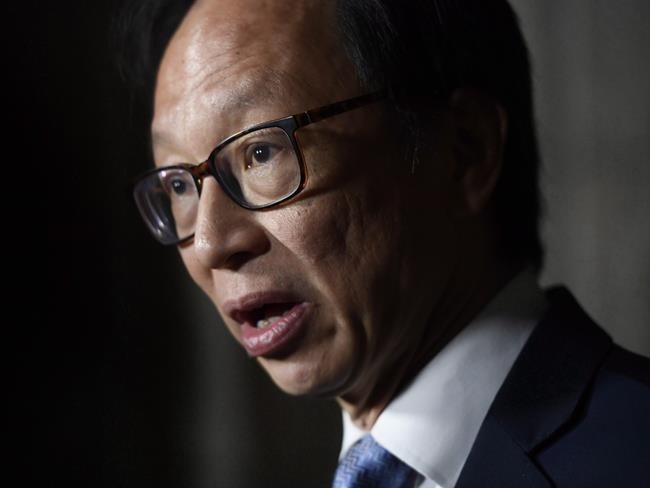
OTTAWA — A prospective foreign influence registry must not be «overly broad» to avoid unfairly targeting members of the Chinese-Canadian community and other minority groups,a senator said Thursday.
Yuen Pau Woo, who sits in the Independent Senators Group, spoke to reporters Thursday about the upcoming centennial anniversary of the introduction of the Chinese Immigration Act, known also as the Chinese exclusion act.
In a recent tweet, Woo compared the legislation, which forced Chinese immigrants to register themselves or face deportation, to the idea of a foreign influence registry that would keep track of those working in Canada on behalf of other countries.
Public Safety Minister Marco Mendicino had announced last week that the Liberal government was beginning consultations on setting up a registry as part of its response to allegations of Chinese interference in recent Canadian elections.
Mendicino said the government would pay attention to feedback from the Chinese diaspora community.
Woo called the consultation process an «excellent opportunity» for Chinese-Canadians to weigh in, saying their voices are important to ensure the registry «will not be stigmatizing, will not be punishing, will not be alienating in the way that the exclusion act was 100 years ago.»
He warned that the registry could stigmatize communities if it is designed too broadly.
«An overly broad registry that forces individuals to register because of where they come from, because of what they think and because of who they affiliate with would probably go too far.»
The Liberal government’s announcement that was looking to usher in a foreign influence registry comes amid swirling allegations that Beijing meddled in the last two federal elections, as reported by Global News and the Globe and Mail newspaper.
The government has not said when such a registry could be up and running — only that consultations will end in early May.
Woo’s initial tweet comparing the 1923 exclusion act to the idea of a foreign registry was met with criticism by activists involved in trying to redress the historical wrongs done to Chinese immigrants, such as forcing them to pay a head tax upon entry to Canada.
Bill Chu, a veteran Vancouver activist who campaigned for head tax redress, told The Canadian Press earlier this week: «I can’t see how he can complete his statement with a straight face.»
On Thursday, Woo said he hopes his critics agree that efforts should be made to ensure any future foreign registry does not lead to discrimination, saying he hopes they participate in the consultation.
Woo pointed to some of the pushback he has received online and from some critics who are accusing him of being sympathetic to Beijing’s regime.
«I’m a … somewhat protected individual. I don’t like getting these attacks. But think about all the other Chinese people who don’t have my privilege or my protections,» he said.
«Are we going to have a foreign influence registry that’s going to use the views that one holds as the litmus test of being a foreign agent?»
Woo said that the recent examples of his own loyalty being called into question «give pause for worry» about such a scenario.